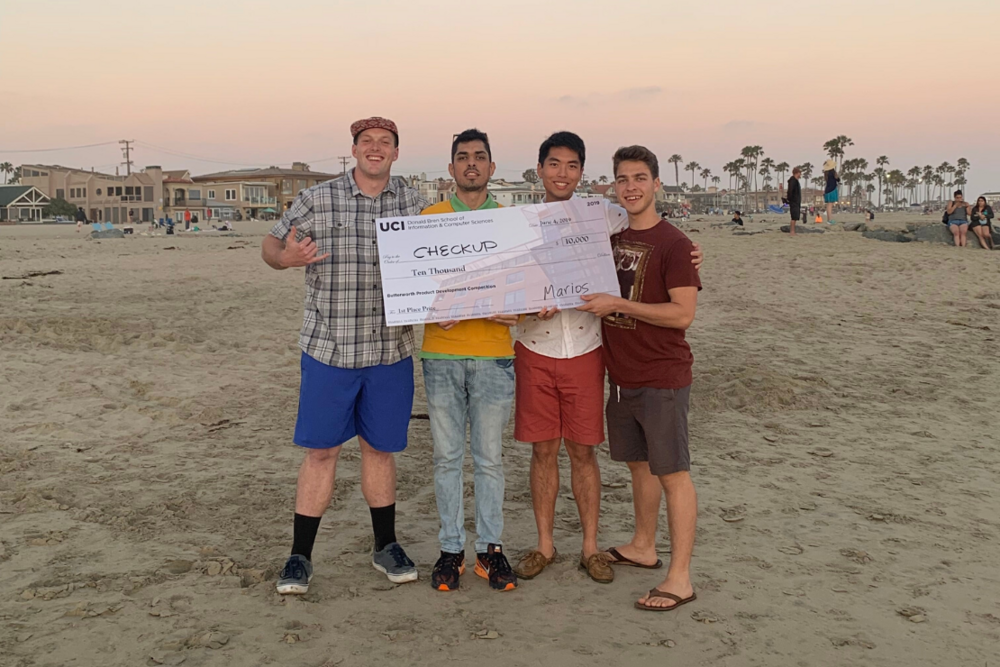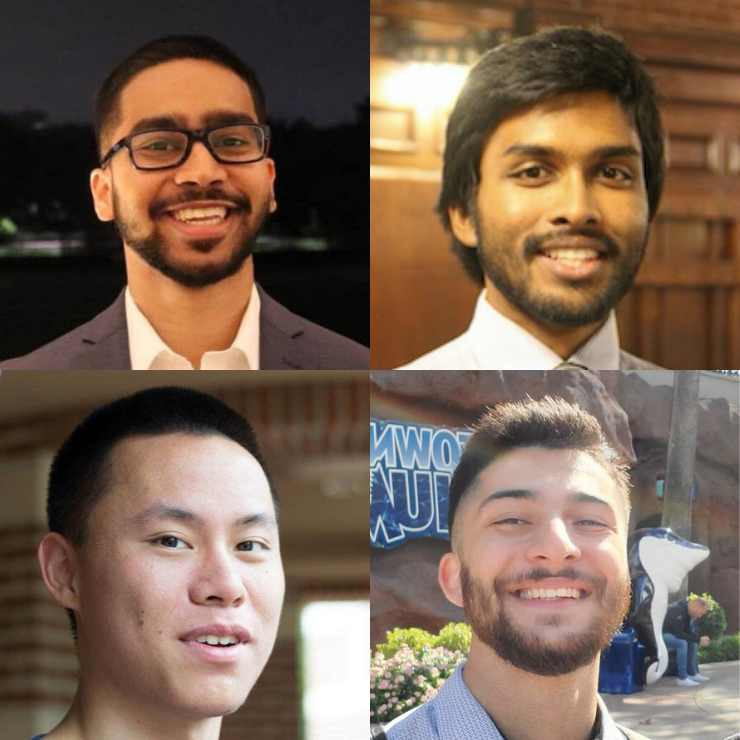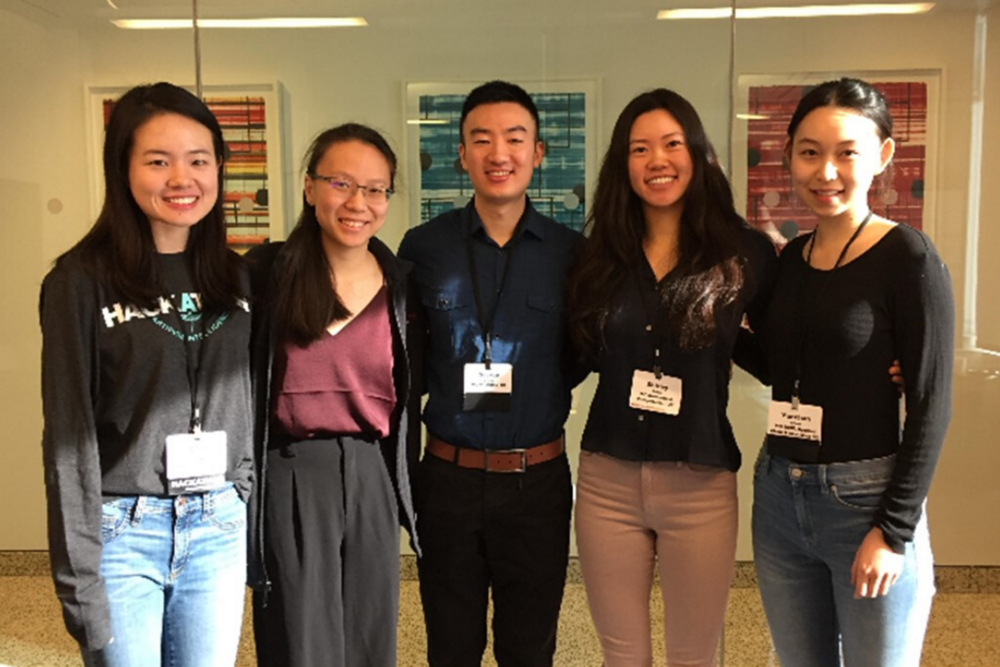LaunchPad Fellowship Startups on Cutting Edge of Healthcare (Part 1)
Jul 22, 2020
5-min read
CheckUp Health, Morpheus Health, SmartBeats, and NeuroBell | LaunchPad Fellowship 2020
The LaunchPad Summer Startup Fellowship, a program of the Blackstone LaunchPad & Techstars network has brought together 50 exceptional student startups working in just about every industry imaginable - including health and wellness.
From health and wellness indicator tracking to personalized pharmaceutical warnings, and even leveraging AI to monitor newborn heart murmurs and brain activity, many of this year’s LaunchPad Fellows are developing innovative solutions to today’s medical challenges. Learn more about these and our other healthcare-focused student entrepreneurial teams.

University of California, Irvine student Zachary Little, and his startup CheckUp Health, have benefited tremendously from the experienced founders, mentors, and advisors brought together in the 8-week virtual LaunchPad Fellowship program. And the motivation to begin his personal wellness-focused company was based in a very personal health challenge.
“Throughout 2018 and 2019 I was feeling pretty bad, but could never figure out what was wrong,” said Zach. “I kept going back to the doctor’s office over and over for different blood tests trying to understand my health. Ultimately I realized that I needed to think of myself as the CEO of my health - measuring key biomarkers and indicators of health consistently in a way that I can understand.”
CheckUp offers a proprietary user interface that visualizes data collected from blood tests, saliva tests, urine tests, stool tests, and physical assessments. Tests will be sold through the app in a subscription model ranging from monthly to yearly assessments. Future iterations will aggregate data from strategic partnerships with other wearable fitness trackers like the Whoop strap, Oura ring, Fitbit, and Apple Watch to feed daily sleep, recovery, and cardiovascular strain data into our user interface.
Over the course of the summer, Zach has found the LaunchPad ‘Lessons Learned’ virtual fireside chats to be immensely helpful. “I've learned so much from them,” said Zach. “Every week I take notes, and summarize my learnings in our slack channel for other LaunchPad Fellows. That helps me lock down the new information in my mind, and summarizing it back to the group hopefully brings value to others.”
Among the ‘Lessons Learned’ that have struck a nerve with Zach include:
Tim Brown, of Allbirds: Doing something with purpose fills you with the energy needed to grind it out.
Josh Aviv, of SparkCharge: The best investors and VCs want to see that you're highly coachable as a founder. If you implement their advice and do well, they'll want to be a part of the upside.
Cecilia Corral, of CareMessage: Find experts. You'll make unnecessary mistakes if it’s the blind leading the blind. One expert can match the output of a full team of less experienced people.
David Brown of Techstars: The #1 reason for startup failure is cofounders breaking up. The only thing more difficult than going through a cofounder breakup is being a solo founder.

Another healthcare-focused team from the University of California system, Morpheus Health, a startup from cofounders at UC, San Diego, was also conceptualized from very personal experiences. In this case, with the complexity and confusion around pharmaceuticals, their efficacy, and their side effects.
Morpheus aims to capture, analyze, and personalize the medication selection process using machine learning so patients can make more informed decisions in their healthcare journey. Ishan Mehta and his cofounders Ashkan Rohani, Farhan Murshed, and Austin Au-Yeung began the LaunchPad Fellowship by dividing their attention into two distinct efforts: the overall consumer platform and the machine learning back-end.
“Over the course of the Fellowship, the startup experience has been an incredibly satisfying, if sometimes frustrating, experience,” said Ishan. “What we failed to fully understand were the infinite intricacies that needed to be considered before we could even think about providing our service to the public. Above all, how would anyone trust our product?”
While the realities of entrepreneurship may have hit the founders hard near the beginning of the summer, that has not stopped them from making critical progress. The team brought on three interns to focus on the business model, revenue model, and go-to-market strategy and further segmented the team to divide and conquer UI/UX Design, Technical Design, and Business Development.
Weekly meetings with LaunchPad Campus Director Jacques Chirazi, and critical insights gleaned from Dr. Julie Hakim (Femtech Focus in Houston) have helped the team move forward. Balance is also key to making startup progress, and Ishan and his team are committed to continuing to monitor competitor successes and identify marketing channels to promote the tool to health bloggers, influencers, and affiliates, all the while continuing to collect the critical medical information most important to users.
According to Ishan, “What we learned early in the Fellowship from Jacques and our mentors was important: You can’t understand what works or what doesn’t if you refuse to develop something. Our pride and fear of failure was preventing us from developing anything since we were too focused on developing the ‘perfect product’.”

Finally, SmartBeats, a LaunchPad Fellowship startup team of Weill Cornell medical students is bringing AI technology to the forefront of pediatric primary care. According to Candace Chien, and her co-founders George Zhou and Yunchan Chen, their mission is to support pediatricians in making clinically-significant and cost-effective care decisions by enabling them to classify heart murmurs at the bedside with a machine learning-enabled digital stethoscope.
“It takes 10,000 hours of listening to heart sounds for training physicians to be able to decisively distinguish between the different heart sounds,” said Candace. “In practice, this training is only undertaken by the most specialized physicians. And when 75% of newborns and 66% of all children present with a heart murmur — but only 1% of children are born with congenital heart disease each year — this lack of experienced-assessment capability leaves a significant gap in the pediatric primary care setting.”
On the business development side, over the course of the LaunchPad Fellowship, the SmartsBeats team has been connecting with various individuals through Cornell, Northwestern, and LaunchPad to improve their device strategy. These mentor connections include one Techstars founder and another LaunchPad founder who are developing other pediatric screening devices.
“Listening to these stories and the challenges helped us refine the pieces that we need to focus on,” said Candace. “At the end of the conversation, we left with advice around regulatory requirements, and we were able to provide one of them a connection to a market research panel of U.S. insurers. The timing was impeccable.”
On the technical development side, the team is also making significant progress in terms of both software and hardware development. Their engineering team spent the last few weeks developing their expertise on machine learning and signal processing, diving into digital signal processing literature, as well as learning the theory behind specific machine learning techniques.
Moving forward, the SmartBeats team plans to continue utilizing the resources of the LaunchPad network to make progress on their startup — in particular continuing to engage with various experts for their advice and guidance.
Of course no compendium of healthcare-focused LaunchPad Fellowship student startups would be complete without including NeuroBell, founded by Mark O’Sullivan from University College Cork (UCC), Ireland. Another solution aimed at tech-enabled newborn health, NeuroBell is developing a portable brain monitoring device with diagnostic decision support software. Over the course of this summer, (and in the absence of access to the university laboratory) Mark has moved his well-recognized startup forward by developing more connections and a deeper network in the U.S., as well as developing a route to market pathway for both the U.S. and the U.K..
“Being a participant on the Summer Fellowship has added significant credibility to my spin-out plans and will help me to attract high-value experts to help us build NeuroBell,” said Mark.
